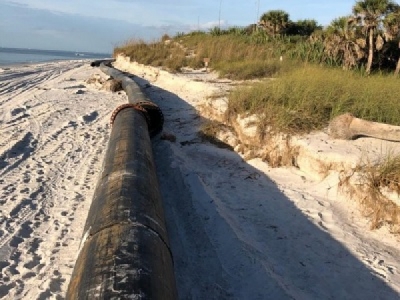
Posted on December 17, 2018
The renourishment of Egmont Key’s critically-eroded beaches is at a standstill because the project resulted in the deaths of six sea turtles, the maximum allowed.
The $10 million project, which began last month and was suspended on Dec. 2, is expected to resume in late spring or early summer, before hurricane season, said Susan Jackson, with the U.S. Army Corps of Engineers’ Jacksonville corporate communications office.
Egmont Key, home of historic Fort Dade, lies north of Anna Maria Island in Tampa Bay. Its western shore was set to get sand dredged from 17 miles of the Tampa Harbor Egmont and Mullet Key channel cuts.
The dredge removed about 100,000 cubic yards of material from the channel, completing about 25 percent of the dredging project. About 40,000 cubic yards of sand was placed on the beach at Egmont Key from Nov. 26 to Dec. 2, she said, adding that the channel is not yet in critical need of dredging, so the delay is not expected to cause problems with shipping.
Six turtles were “taken,” or killed, including three loggerheads and three Kemp’s ridleys, between Nov. 25-30 during the Tampa Harbor project, and were identified by two endangered species observers on board the dredge around the clock, she said.
The word “take,” defined by the federal Endangered Species Act, means to “harass, harm, pursue, hunt, shoot, wound, kill, trap, capture, or collect, or to attempt to engage in any such conduct.”
The Corps is permitted to take four loggerheads and three Kemp’s ridleys in all its Gulf of Mexico dredging projects from Oct. 1, 2018 through Sept. 30, 2019 under NOAA’s National Marine Fisheries Service regulations, Jackson said. Most takes are caused by dredge suction.
Egmont Key is a nesting ground for sea turtles, gopher tortoises and shorebirds, and is protected by state and federal law as Egmont Key State Park and Egmont Key National Wildlife Refuge.
Sea turtles broke nesting records on Egmont the past two years, with the 2018 season that ended on Oct. 31 producing 150 nests, according to the Egmont Key Alliance.
The project was timed for winter in part to avoid sea turtles and allow wave action to naturally sort the sand and silt to make it suitable for the 2019 turtle nesting season, which begins May 1.
Source: amisun





